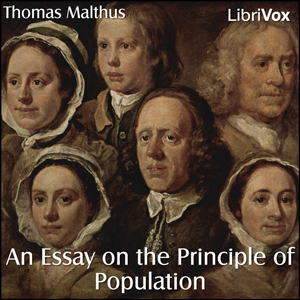
The power of population is indefinitely greater than the power in the earth to produce subsistence for man. Population, when unchecked, increases in a geometrical ratio. Subsistence increases only in an arithmetical ratio. A slight acquaintance with numbers will show the immensity of the first power in comparison with the second (Malthus).

Other Audiobook
Audiobook: American Civil War Collection, Volume 1
Compilation of American Civil War related poems and short works of literature. Summary by Bill2147
Audiobook: Os Sertões
Os Sertões é um livro brasileiro, escrito por Euclides da Cunha e publicado em 1902.
Audiobook: Portraits of Russian Poets
«Портреты русских поэтов»: Ахматова, Бальмонт, Балтрушайтис, Блок, Брюсов, Белый, Волошин, Есенин, Иванов, Мандельштам, Маяковский, Пастернак,
Audiobook: Pauline’s Passion and Punishment
Before she wrote Little Women and Little Men, Louisa, writing under the pseudonym A.M. Barnard,
Audiobook: Series of Lessons in Raja Yoga
The Book talks on the internal world of the self. The real nature of the
Audiobook: Prowling About Panama
In 1903, Panama became a brand new state in Central America by seceding from Colombia
Audiobook: Lucian’s Dialogues Volume 3: The Dialogues of the Dead
Dialogues of the Dead are 30 miniature dialogues mocking the Homeric conception of the Greek
Audiobook: Jesus of History
A collection of a series of lectures delivered while Glover was in India setting the
Audiobook: Commentary on Romans
Theodoret was born at Antioch, A.D. 386. His studies were pursued under Theodore of Mopsuista
Audiobook: Lectures On Painting Delivered To The Students Of The Royal Academy
This 1883 book contains chapters on ancient costumes, Byzantine and Romanesque art, David and his
Audiobook: Outdoor Girls at Ocean View
In “The Outdoor Girls at Ocean View, Or The Box that Was Found in the
Audiobook: Bible (Reina Valera) 25: Lamentaciones de Jeremías
El libro de Lamentaciones se compone de cinco poemas, cada uno de los cuales es